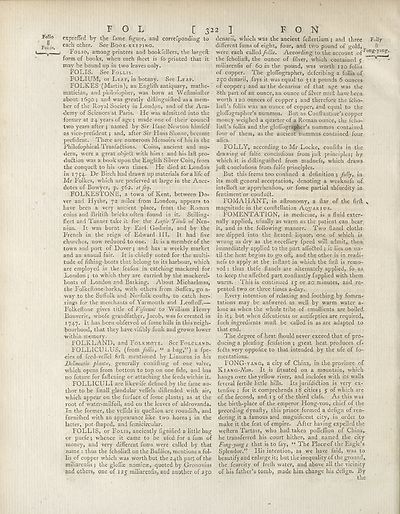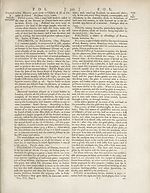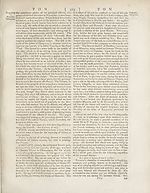Encyclopaedia Britannica > Volume 7, ETM-GOA
(350) Page 322
Download files
Complete book:
Individual page:
Thumbnail gallery: Grid view | List view

Folio
F O L [ 322 ] F O
expreffcd by the fame. figure, and correfponding to
each other. See Book-keeping.
Folio, among printers and bookfellers, the largeft
form of books, when each fheet is fo printed that it
may be bound up in two leaves only.
FOLIS. See Follis.
FOLIUM, or Leaf, in botany. See Leaf.
FOLKES (Martin), an Engliflr antiquary, mathe¬
matician, and philofqpher, was born at Weftminfter
about 1690 ; and was greatly diltinguifhed as a mem¬
ber of the Royal Society in London, and of the Aca-
demy of Sciences at Paris. He was admitted into the
former at 24 years of age ; made one of their council
two yeans after ; named by Sir Ifaac Newton himfelf
as vice-prefident ; and, after Sir Hans Sloane, became
prefident. There are numerous Memoirs of his in the
Philofophical Tranfa&ions. Coins, ancient and mo¬
dern, were a great objefl; with him : and his laft pro¬
duction was a book upon the Engliih Silver Coin, from
the conquelt to his own times. He died at London
in 1754. Dr Birch had drawn up materials for a life of
Mr Folkes, which are preferved at large in the Anec¬
dotes of Bowyer, p. 562. et feq.
FOLKESTONE, a town of Kent, between Do¬
ver and Hythe, 72 miles from London, appears to
have been a very ancient place, from the Roman
coins and Britiih bricks often found in it. Stilling-
fleet and Tanner take it for the Lapis Tituli of Nen¬
nius. It was burnt by Flarl Godwin, and by the
French in the reign of Edward III. It had five
churches, now reduced to one. It is a member of the
town and port of Dover ; and has a weekly market
and an annual fair. It is chiefly noted for the multi¬
tude of fifliing-boats that belong to its harbour, which
are employed in the feafon in catching mackerel for
London ; to which they are carried by the mackerel-
boats of London and Barking. About Michaelmas,
the Folkeftone-barks, with others from Suficx, go a-
way to the Suffolk and Norfolk coafls, to catch her-,
rings for the merchants of Yarmouth and Leoftoff.—
Folkeftone gives title of Vifcount to William Flenry
Bouverie, whofe grandfather, Jacob, wasfo created in
1747. It has been obferved of fome hills in this neigh¬
bourhood, that they have vifibly funk and grown lower
within memory.
FOLKLAND, and Folkmo.te. SeeFoLCLAND;
FOLLICULUS, (from follis, “ a bag,”) a fpe-
eies of feed-vefiel firft mentioned by Linmsus in his
Delineatio planta,, generally confiding of one valve,
which opens from bottom to top on one fide, and has
no future for fadening or attaching the feeds within it.
FOLLICULI are likewil’e defined by the fame au¬
thor to be fmall glandular veffels didended with air,
which appear on the furface of fome plants; as at the
root of water-milfoil, and on the leaves of aldrovanda.
In the former, the veffels in quedion are roundifh, and
furnifhed with an appearance like two horns ; in the
latter, pot-fhaped, and femicircular.
FOLLIS, or Folis, anciently fignified a little bag
or purfe ; whence it came to be ufed for a fum of
money, and very different fums were called by that
name : thus the fcholiad on the Bafilics, mentions a fol¬
lis of copper which was worth but the 24th part of the
miliarenfis; the gloffae nomicae, quoted by Gronovius
and others, one of 125 miliarenfis, and another of 250
denarii, which was the ancient federtium ; and three Folly
diflerent fums of eight, four, and two pound of gold, II
were each called fullis. According- to the account 0fFoI1g~yang»
the fcholiad, the ounce of filver, which contained 5 v
miliarenfis of 60 in the pound, was worth 120 follis
of copper. The gloffographer, defcribing a follis of
250 denarii, fays it was equal to 312 pounds 6 ounces
of copper ; and as the denarius of that age was the
8th part of an ounce, an ounce of filver mull have been
worth 120 ounces of copper ; and therefore the fdio-
liad’s foliis was an ounce of copper, and equal to the
gloffographer’s nummus. But as Condantine’s copper
money weighed a quarter of a Roman ounce, the fcho-
liad’s follis and the gloffographer’s nummus contained
four of them, as the ancient nummus contained four
affes.
FOLLY, according to Mr Locke, confids in the
drawing of falfe conclufions from jud principles; by
which it is didinguilhed from madnefs, which draws
jud conclufions from falfe principles.
But this feems too confined a definition ; folly, in
its mod general acceptation, denoting a weaknefs of
intelled or apprehenfion, or fome partial abfurdity in
fentiment or conduft.
FOMAHANT, in adronomy, a dar of the firfl; *
magnitude in the condellation Aquarius.
FOMENTATION, in medicine, is a fluid exter¬
nally applied, ufually as warm as the patient can bear
it, and in the following manner. Two flanel cloths
are dipped into the heated liquor; one of which is
wrung as dry as the neceffary fpeed will admit,, then
immediately applied to the part afferffed ; it lies on un¬
til the heat begins to go off, and the other is in readi-
nefs to apply at the indant in which the fird is remo¬
ved : thus thefe flanels are alternately applied, fo as.
to keep the affe&ed part condantly fupplied with them
warm. This is continued 15 or 20 minutes, and re¬
peated two or three times a-day-.
Every intention of relaxing and Toothing by fomen¬
tations may be anfwered as well by warm water a-
lone as when the whole tribe of emollients are boiled,
in it; but when difeutients or antifeptics are required,
fuch ingredients mud be called in as are adapted to
that end.
The degree of heat fliould never exceed that of pro¬
ducing a pleafing fenfation ; great heat produces ef¬
fects very oppofite to that intended by the ufe of fo¬
mentations.
FONG-yang, a city of China, in the province of
KlANG-jVhw. It is fituated on a mountain, which
hangs over the yellow river, and inclofes with its walls
fereral fertile little hills. Its jurifdi&ion is very ex-
tenfive : for it comprehends 18 cities; 5 of which are
of the fecond, and 13 of the third clafs. As this was
the birth-place of the emperor Hong-vou, chief of the
preceding dynady, this prince formed a defign of ren¬
dering it a famous and magnificent city, in order to
make it the feat of empire. After having expelled the
wedern Tartars, who had taken poffefiion of China,
he transferred his court hither, and named the city
Fong-yang ; that is to fay, “ The Place-of the Eagle’s
Splendor.” His intention, as we have faid, was to
beautify and enlarge it; but the inequality of the ground,,
the fcarcity of frefli water, and above all the vicinity
of his father’s tomb, made him change his defign. By
F O L [ 322 ] F O
expreffcd by the fame. figure, and correfponding to
each other. See Book-keeping.
Folio, among printers and bookfellers, the largeft
form of books, when each fheet is fo printed that it
may be bound up in two leaves only.
FOLIS. See Follis.
FOLIUM, or Leaf, in botany. See Leaf.
FOLKES (Martin), an Engliflr antiquary, mathe¬
matician, and philofqpher, was born at Weftminfter
about 1690 ; and was greatly diltinguifhed as a mem¬
ber of the Royal Society in London, and of the Aca-
demy of Sciences at Paris. He was admitted into the
former at 24 years of age ; made one of their council
two yeans after ; named by Sir Ifaac Newton himfelf
as vice-prefident ; and, after Sir Hans Sloane, became
prefident. There are numerous Memoirs of his in the
Philofophical Tranfa&ions. Coins, ancient and mo¬
dern, were a great objefl; with him : and his laft pro¬
duction was a book upon the Engliih Silver Coin, from
the conquelt to his own times. He died at London
in 1754. Dr Birch had drawn up materials for a life of
Mr Folkes, which are preferved at large in the Anec¬
dotes of Bowyer, p. 562. et feq.
FOLKESTONE, a town of Kent, between Do¬
ver and Hythe, 72 miles from London, appears to
have been a very ancient place, from the Roman
coins and Britiih bricks often found in it. Stilling-
fleet and Tanner take it for the Lapis Tituli of Nen¬
nius. It was burnt by Flarl Godwin, and by the
French in the reign of Edward III. It had five
churches, now reduced to one. It is a member of the
town and port of Dover ; and has a weekly market
and an annual fair. It is chiefly noted for the multi¬
tude of fifliing-boats that belong to its harbour, which
are employed in the feafon in catching mackerel for
London ; to which they are carried by the mackerel-
boats of London and Barking. About Michaelmas,
the Folkeftone-barks, with others from Suficx, go a-
way to the Suffolk and Norfolk coafls, to catch her-,
rings for the merchants of Yarmouth and Leoftoff.—
Folkeftone gives title of Vifcount to William Flenry
Bouverie, whofe grandfather, Jacob, wasfo created in
1747. It has been obferved of fome hills in this neigh¬
bourhood, that they have vifibly funk and grown lower
within memory.
FOLKLAND, and Folkmo.te. SeeFoLCLAND;
FOLLICULUS, (from follis, “ a bag,”) a fpe-
eies of feed-vefiel firft mentioned by Linmsus in his
Delineatio planta,, generally confiding of one valve,
which opens from bottom to top on one fide, and has
no future for fadening or attaching the feeds within it.
FOLLICULI are likewil’e defined by the fame au¬
thor to be fmall glandular veffels didended with air,
which appear on the furface of fome plants; as at the
root of water-milfoil, and on the leaves of aldrovanda.
In the former, the veffels in quedion are roundifh, and
furnifhed with an appearance like two horns ; in the
latter, pot-fhaped, and femicircular.
FOLLIS, or Folis, anciently fignified a little bag
or purfe ; whence it came to be ufed for a fum of
money, and very different fums were called by that
name : thus the fcholiad on the Bafilics, mentions a fol¬
lis of copper which was worth but the 24th part of the
miliarenfis; the gloffae nomicae, quoted by Gronovius
and others, one of 125 miliarenfis, and another of 250
denarii, which was the ancient federtium ; and three Folly
diflerent fums of eight, four, and two pound of gold, II
were each called fullis. According- to the account 0fFoI1g~yang»
the fcholiad, the ounce of filver, which contained 5 v
miliarenfis of 60 in the pound, was worth 120 follis
of copper. The gloffographer, defcribing a follis of
250 denarii, fays it was equal to 312 pounds 6 ounces
of copper ; and as the denarius of that age was the
8th part of an ounce, an ounce of filver mull have been
worth 120 ounces of copper ; and therefore the fdio-
liad’s foliis was an ounce of copper, and equal to the
gloffographer’s nummus. But as Condantine’s copper
money weighed a quarter of a Roman ounce, the fcho-
liad’s follis and the gloffographer’s nummus contained
four of them, as the ancient nummus contained four
affes.
FOLLY, according to Mr Locke, confids in the
drawing of falfe conclufions from jud principles; by
which it is didinguilhed from madnefs, which draws
jud conclufions from falfe principles.
But this feems too confined a definition ; folly, in
its mod general acceptation, denoting a weaknefs of
intelled or apprehenfion, or fome partial abfurdity in
fentiment or conduft.
FOMAHANT, in adronomy, a dar of the firfl; *
magnitude in the condellation Aquarius.
FOMENTATION, in medicine, is a fluid exter¬
nally applied, ufually as warm as the patient can bear
it, and in the following manner. Two flanel cloths
are dipped into the heated liquor; one of which is
wrung as dry as the neceffary fpeed will admit,, then
immediately applied to the part afferffed ; it lies on un¬
til the heat begins to go off, and the other is in readi-
nefs to apply at the indant in which the fird is remo¬
ved : thus thefe flanels are alternately applied, fo as.
to keep the affe&ed part condantly fupplied with them
warm. This is continued 15 or 20 minutes, and re¬
peated two or three times a-day-.
Every intention of relaxing and Toothing by fomen¬
tations may be anfwered as well by warm water a-
lone as when the whole tribe of emollients are boiled,
in it; but when difeutients or antifeptics are required,
fuch ingredients mud be called in as are adapted to
that end.
The degree of heat fliould never exceed that of pro¬
ducing a pleafing fenfation ; great heat produces ef¬
fects very oppofite to that intended by the ufe of fo¬
mentations.
FONG-yang, a city of China, in the province of
KlANG-jVhw. It is fituated on a mountain, which
hangs over the yellow river, and inclofes with its walls
fereral fertile little hills. Its jurifdi&ion is very ex-
tenfive : for it comprehends 18 cities; 5 of which are
of the fecond, and 13 of the third clafs. As this was
the birth-place of the emperor Hong-vou, chief of the
preceding dynady, this prince formed a defign of ren¬
dering it a famous and magnificent city, in order to
make it the feat of empire. After having expelled the
wedern Tartars, who had taken poffefiion of China,
he transferred his court hither, and named the city
Fong-yang ; that is to fay, “ The Place-of the Eagle’s
Splendor.” His intention, as we have faid, was to
beautify and enlarge it; but the inequality of the ground,,
the fcarcity of frefli water, and above all the vicinity
of his father’s tomb, made him change his defign. By
Set display mode to:
![]() Universal Viewer |
Universal Viewer | ![]() Mirador |
Large image | Transcription
Mirador |
Large image | Transcription
Images and transcriptions on this page, including medium image downloads, may be used under the Creative Commons Attribution 4.0 International Licence unless otherwise stated. ![]()
| Encyclopaedia Britannica > Encyclopaedia Britannica > Volume 7, ETM-GOA > (350) Page 322 |
|---|
| Permanent URL | https://digital.nls.uk/189125779 |
|---|
| Attribution and copyright: |
|
|---|
| Description | Ten editions of 'Encyclopaedia Britannica', issued from 1768-1903, in 231 volumes. Originally issued in 100 weekly parts (3 volumes) between 1768 and 1771 by publishers: Colin Macfarquhar and Andrew Bell (Edinburgh); editor: William Smellie: engraver: Andrew Bell. Expanded editions in the 19th century featured more volumes and contributions from leading experts in their fields. Managed and published in Edinburgh up to the 9th edition (25 volumes, from 1875-1889); the 10th edition (1902-1903) re-issued the 9th edition, with 11 supplementary volumes. |
|---|---|
| Additional NLS resources: |
|

